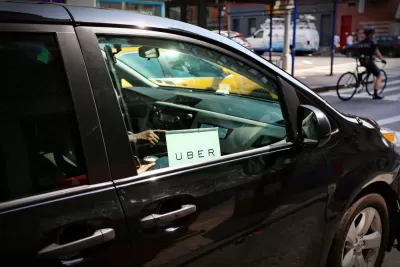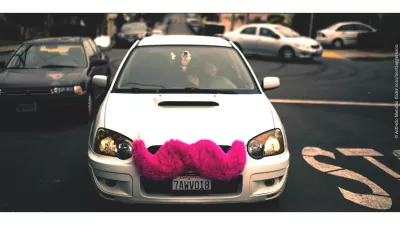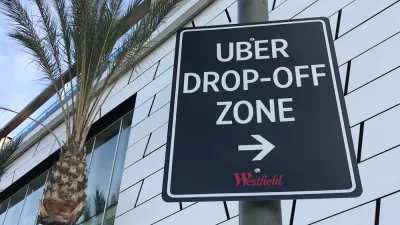An op-ed appeals to a customer base that doesn't understand the ways in which "sharing economy" companies resemble Wal-Mart.

At the PolicyLink Equity Summit the last week of October, Orson Aguilar of the Greenlining Institute was taking a poll of the room at the workshop on the "Gig Economy." How many people used Uber? Quite a lot of sheepish hands went up. How many AirBnB? More. Later we found out that not nearly so many of us shopped at Wal-Mart. Was it a class difference? Or a different awareness of business and labor practices?
The point of asking these questions was not to guilt trip anyone, but it did serve to point out (a) that there's a huge demand for these services and (b) there's a large customer base out there that doesn't necessarily yet understand the ways in which these "sharing economy" companies are acting in many ways as badly as Wal-Mart. Could these customers perhaps could be mobilized to support the workers working in them?
The session itself featured Derecka Mehrens of Working Partnerships USA, Dawn Gearhart of the Teamsters Local 117 in Seattle, which is helping Uber drivers to organize, and Seattle Councilman Mike O'Brien. Together they painted a picture of companies that despite their fancy tech trappings were basically going back to the bad old days of piece work payments and no labor protections whatsoever. (See below, or the Driving for Dignity campaign for more.)
I had trouble sleeping that night and got up around 1am to write a column for my local alt-weekly here in Albany, NY, about what I had learned at that session, since there has been a petition started by some business owners to bring Uber to this area. The day after I turned the column in, the paper was seized for back taxes and didn't publish an issue for the first time in 38 years—a victim of mismanagement, but also free ad-listing sites like Craigslist. A fitting demise for a column about a different "disruptive tech" innovation? Perhaps.
But I'm not one to let a hour of late-night writing go to waste, so I'm sharing what I wrote with you. I'm interested to hear from Shelterforce readers what the reaction is to Uber in your metro areas? Is there pushback? Are your constituents eager for the flexible jobs, or wary?
---
So Wal-Mart’s pretty bad, right? Most progressives can agree on that. Whether or not we actually succumb to shopping there, we know the drill: They pay minimum wage or barely above, don’t offer good benefits, union-bust, drive down working conditions for suppliers, promote sprawl. They could hardly be worse, right?
Imagine something with me:
What if Wal-Mart promised $35/hour, but some of its associates in Seattle at the end of the year realized after expenses they’d made more like $2 to 3, with others maybe $9–12?
What if instead of pressuring reluctant municipalities for zoning changes and building permits, Wal-Mart just started building without regard to the law, and told local government, “The people want us here, better change your laws.”
What if Wal-Mart didn’t invest any capital in its stores at all, but made its employees take out high-interest rate loans to purchase inventory and build the store—loans they are still on the hook for if they stop working there?
What if workers needed to provide their own liability insurance—though they might also be on the hook for fraud for using it for commercial purposes?
What if those workers were not covered by any labor standards or worker protection laws whatsoever?
What if every time Wal-Mart had a sale, the drop in prices came out of the worker’s checks instead of the store’s gross receipts—and the sale price was often made permanent?
Congratulations—you’ve just imagined UberX, the high-tech taxi alternative, and its ilk. (I refuse to call them “ridesharing.” There’s nothing sharing about it. It’s a business transaction.) Uber’s drivers are “independent contractors,” subject to absolutely no worker protections and given no training or insurance, fireable at will based on retaliatory ratings from sometimes-abusive customers (if your rating falls below 4.6 or so, you’re apparently toast), indentured to car loans that Dawn Gearhart of Teamsters Local 117 in Seattle says are often co-signed by Uber because drivers wouldn’t qualify otherwise, competing for fares to scrape by . . . all while making the company worth $52 billion.
There is a petition going around to bring Uber to the Capital Region right now, and let me say that as an occasional taxi user, I understand the desire. Our taxis leave something to be desired. Uber makes things easy and (usually) pleasant. No cash. No guessing who to call and whether one will be available. No smoky smells or strangers riding with you home from the train station.
But we have to understand what the economic model of the gig economy is—it’s a return to piecework. It’s old-fashioned worker exploitation and complete absence of responsibility on the part of the employers for the people who are making them stinking rich, in shiny new “app” clothing. The people who are organizing Uber drivers say most drivers are immigrants—often refugees—driving often 12-16 hours a day and sleeping in their cars. Many of them are also taxi drivers, driving for Uber in their off hours. (Remember that part about how sleep-deprived driving is as bad as drunk driving? That alone should give you serious pause.)
Here’s another story, as told by Seattle Councilman Mike O’Brien. In Seattle, a local taxi company owned by an Ethiopian immigrant created a ride-hailing app. They went to city council, which regulates every aspect of the taxi industry, and were told no, it was illegal. Not having the resources to fight city hall, they set it aside. A few years later, Uber shows up and starts brazenly operating illegally. City council rolls over.
I hope New York's Capital Region doesn’t roll over—not that it is inflexible about innovation in the world of taxi services, mind you. Something needs to give. But that it doesn’t let itself be bullied by a company whose business model is to completely flout local governments’ legitimate concerns about the safety and decency of their operations and to treat its workers like they are disposable and worthless.
I would hope to see something instead like a driver-owned co-op with its own app that improves our transportation options while operating responsibly and generating safe, living-wage jobs and keeping the profits circulating in the community. But if Uber does come here, I hope that their customers at least rise up to support their drivers in organizing for collective bargaining rights.
The gig economy is not something new and outside the world of exploitative capitalism just because it comes with an app. The people who work in it are workers, and their working conditions matter just as much as the working conditions of any other worker.
FULL STORY: Uber-noxious

Alabama: Trump Terminates Settlements for Black Communities Harmed By Raw Sewage
Trump deemed the landmark civil rights agreement “illegal DEI and environmental justice policy.”

Study: Maui’s Plan to Convert Vacation Rentals to Long-Term Housing Could Cause Nearly $1 Billion Economic Loss
The plan would reduce visitor accommodation by 25% resulting in 1,900 jobs lost.

Why Should We Subsidize Public Transportation?
Many public transit agencies face financial stress due to rising costs, declining fare revenue, and declining subsidies. Transit advocates must provide a strong business case for increasing public transit funding.

Paris Bike Boom Leads to Steep Drop in Air Pollution
The French city’s air quality has improved dramatically in the past 20 years, coinciding with a growth in cycling.

Why Housing Costs More to Build in California Than in Texas
Hard costs like labor and materials combined with ‘soft’ costs such as permitting make building in the San Francisco Bay Area almost three times as costly as in Texas cities.

San Diego County Sees a Rise in Urban Coyotes
San Diego County experiences a rise in urban coyotes, as sightings become prevalent throughout its urban neighbourhoods and surrounding areas.
Urban Design for Planners 1: Software Tools
This six-course series explores essential urban design concepts using open source software and equips planners with the tools they need to participate fully in the urban design process.
Planning for Universal Design
Learn the tools for implementing Universal Design in planning regulations.
Smith Gee Studio
Alamo Area Metropolitan Planning Organization
City of Santa Clarita
Institute for Housing and Urban Development Studies (IHS)
City of Grandview
Harvard GSD Executive Education
Toledo-Lucas County Plan Commissions
Salt Lake City
NYU Wagner Graduate School of Public Service




























